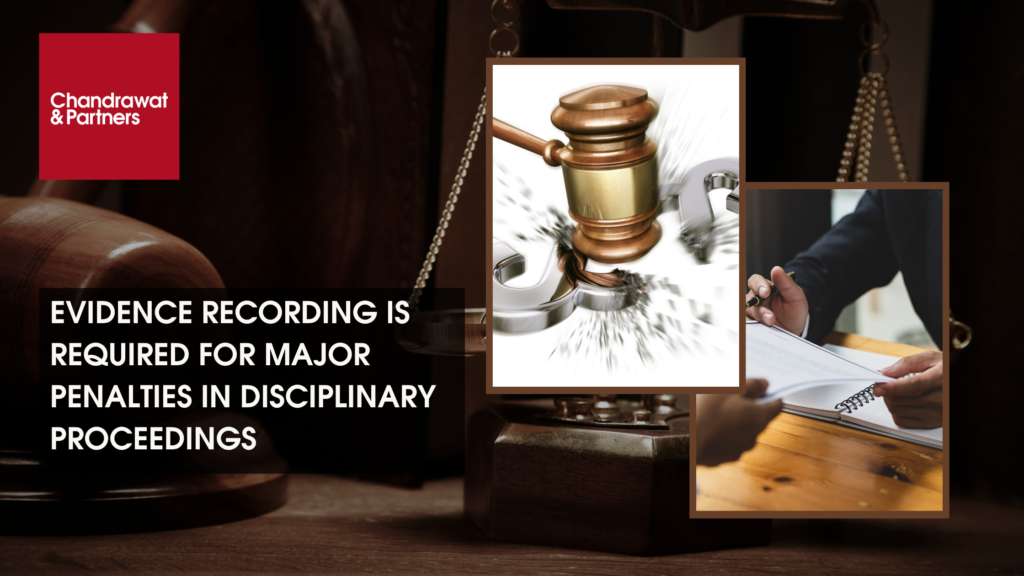Home > Recent Judgements > Evidence Recording Is Required For Major Penalties In Disciplinary Proceedings
Nov 19, 2024

BACKGROUND
In the case of Satyendra Singh versus state of Uttar Pradesh & Anr, the case involves a government employee, the Assistant Commissioner in the Commercial Tax Department, was subjected to disciplinary action for alleged misconduct in the past while serving as an officer. He was served with a charge sheet in the month of March 2012, and an Inquiry Officer’s report was submitted in the month of November 2012 which was followed by a penalty of censure entry and the stopping of two grade increments. However, the Uttar Pradesh State Public Services Tribunal quashed the penalty order, citing a lack of proper evidence and irrational findings. High Court reinstated penalty order of the Tribunal which necessitated the appellant to go to the Supreme Court. The appellant contended that the inquiry was unlawful as no oral evidence or witnesses were presented, violating procedural requirements under Rule 7(3) of the Uttar Pradesh Government Servant (Discipline and Appeal) Rules, 1999, which mandates the recording of oral evidence when a major penalty is proposed. The Supreme Court ultimately ruled in favour of the appellant, setting aside the High Court’s decision, and restoring the Tribunal’s order.
ISSUES
- Whether the disciplinary proceedings against the appellant were lawful in the absence of recorded oral evidence to support the charges of a major penalty?
- Whether the High Court erred in reinstating the disciplinary authority’s order despite the lack of compliance with procedural requirements under Rule 7(3) of the Uttar Pradesh Government Servant (Discipline and Appeal) Rules, 1999?
- Whether the Uttar Pradesh State Public Services Tribunal was correct in quashing the penalty order due to the failure to record oral evidence in the disciplinary proceedings?
- Whether the inquiry proceedings against the appellant were vitiated and non-est in the eyes of the law due to the absence of evidence being recorded, as mandated by the Supreme Court precedents?
JUDGEMENT
The Supreme Court decided the case in favour of the Appellant, an Assistant Commissioner, of Commercial Tax, who was terminated for charges based on a disciplinary inquiry report that did not record any oral evidence. The Court underscored the fact that in relation to the second schedule, the major penalties where evidence is adduced must be recorded in accordance with Rule 7(3) of the Uttar Pradesh Government Servant (Discipline and Appeal) Rules, 1999 and case law as well. The Court held that the disciplinary proceedings were conducted in a defective and non-extant manner owing to the complete lack of oral evidence and therefore, the punishment which was meted out was illegal. The High Court decisions express which restored the imposition of the bit over the reinstatement of the sanction were reversed and the order of the Uttar Pradesh State Public Services Tribunal which quashed the imposition of the penalty was restored as well.
OBSERVATION
The Supreme Court observed that it is a prerequisite to record oral evidence in support of the charges in the case of disciplinary action which is accompanied by some major penalties as reflected in legal practice. The Court stressed that even an ex-parte inquiry leaves it to the Inquiry Officer to give adequate proof of the charges. In the present case, the lack of recorded oral statements made the whole disciplinary process irrelevant and null and void within the legal context. The Court noted that the High Court was wrong to approve the restoration of the penalty that was imposed by the disciplinary authority in the instant case because the procedural provisions were not followed under the Uttar Pradesh Government Servant (Discipline and Appeal) Rules, 1999. The Court therefore reinstated the judgment of the Uttar Pradesh State Public Services Tribunal who had set aside the order of punishment.
For more information or queries, please email us at
enquiries@chandrawatpartners.com




